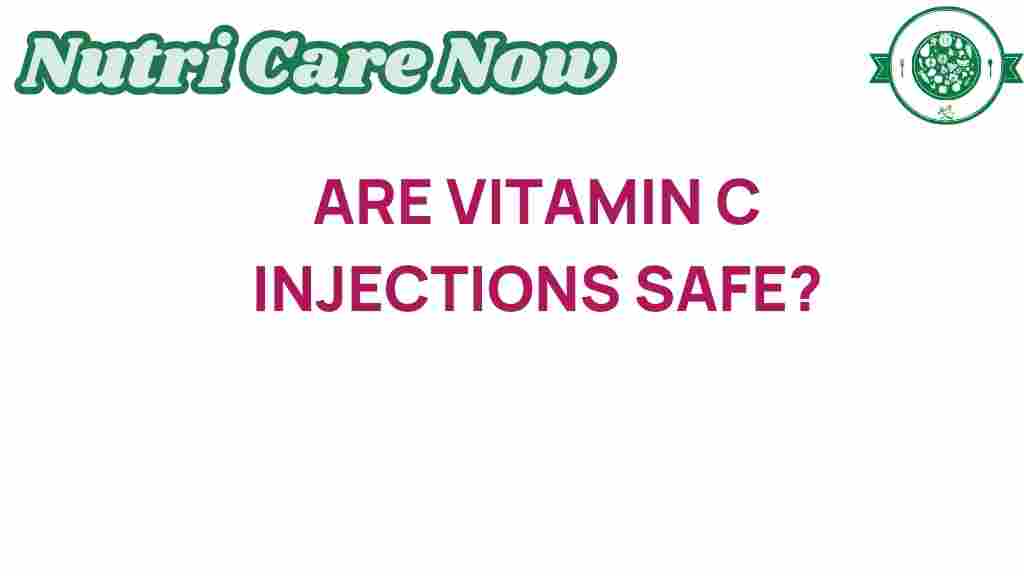Are Vitamin C Injections Safe? Unpacking the Controversy
Vitamin C, also known as ascorbic acid, is a vital nutrient that plays a crucial role in various bodily functions, including immune support and skin health. Recently, vitamin C injections have gained popularity as a method to enhance health and treat various conditions. However, the safety and effectiveness of these injections have sparked considerable debate among health professionals and patients alike. In this article, we will delve into the safety of vitamin C injections, their health benefits, alternative treatments, potential side effects, and medical opinions.
Understanding Vitamin C Injections
Vitamin C injections involve administering high doses of vitamin C directly into the bloodstream. This method is often utilized for its potential therapeutic effects. Unlike oral vitamin C, which can be limited by gastrointestinal absorption, injections provide a more direct and higher concentration of the vitamin in the body.
The Health Benefits of Vitamin C Injections
Proponents of vitamin C injections tout a variety of health benefits, including:
- Immune Support: Vitamin C is known to enhance the immune system, potentially reducing the duration and severity of colds and infections.
- Antioxidant Properties: Vitamin C acts as a powerful antioxidant, helping to neutralize free radicals and reduce oxidative stress.
- Skin Health: Injections can promote collagen production, improving skin elasticity and reducing signs of aging.
- Chronic Disease Management: Some studies suggest that high doses of vitamin C may benefit conditions such as cancer, heart disease, and arthritis.
- Energy Boost: Many users report increased energy levels and improved mood following injections.
While these benefits are promising, it’s essential to evaluate the scientific backing for these claims and consider varying medical opinions.
Safety Considerations for Vitamin C Injections
When discussing the safety of vitamin C injections, several factors should be considered:
Medical Opinions
Medical professionals have differing views on the safety and efficacy of vitamin C injections. Some argue that:
- High doses of vitamin C can lead to adverse effects, particularly in individuals with certain health conditions.
- Vitamin C injections should only be administered under medical supervision to monitor potential complications.
- Oral vitamin C may be sufficient for most individuals, making injections unnecessary.
Conversely, some integrative medicine practitioners advocate for vitamin therapy, including injections, as a complementary treatment for various conditions.
Potential Side Effects
While vitamin C is generally considered safe, especially at lower doses, potential side effects of vitamin C injections can include:
- Local Reactions: Pain, redness, or swelling at the injection site.
- Gastrointestinal Issues: Nausea, diarrhea, or abdominal cramps, particularly at high doses.
- Kidney Stones: Excessive vitamin C can increase the risk of kidney stone formation.
- Allergic Reactions: Some individuals may experience allergic reactions, including itching or hives.
Alternative Treatments to Vitamin C Injections
For those concerned about the safety of vitamin C injections, several alternative treatments can provide similar benefits:
Oral Vitamin C Supplementation
Oral vitamin C supplements are widely available and can be a safe alternative for most individuals. Although the absorption rate is lower than injections, they still provide significant health benefits.
Dietary Sources of Vitamin C
Incorporating vitamin C-rich foods into your diet can also support immune health. Some excellent dietary sources include:
- Citrus fruits (oranges, lemons, grapefruits)
- Berries (strawberries, blueberries)
- Vegetables (bell peppers, broccoli, Brussels sprouts)
- Leafy greens (spinach, kale)
Intravenous (IV) Vitamin Therapy
IV vitamin therapy combines vitamin C with other nutrients and may be administered in a clinical setting. This method allows for higher doses while potentially reducing the risk of side effects.
Step-by-Step Process of Receiving Vitamin C Injections
If you decide to pursue vitamin C injections, here’s a general outline of the process:
- Consultation: Schedule a consultation with a healthcare provider to discuss your health history, potential benefits, and risks.
- Testing: Your provider may recommend blood tests to assess your vitamin C levels and overall health.
- Dosage Determination: Your healthcare provider will determine the appropriate dosage based on your individual needs.
- Injection Procedure: The injection will typically be administered in a clinical setting, ensuring sterile conditions.
- Follow-Up: Schedule follow-up appointments to monitor your health and discuss any side effects.
Troubleshooting Tips for Vitamin C Injections
If you experience side effects or have concerns about vitamin C injections, consider the following troubleshooting tips:
- Communicate with Your Provider: Always inform your healthcare provider about any side effects or reactions you experience.
- Monitor Your Body: Keep track of how your body responds to the injections and report any unusual symptoms.
- Adjust Dosage: If side effects occur, discuss with your provider the possibility of adjusting the dosage or frequency of injections.
- Consider Alternatives: If injections prove problematic, consider transitioning to oral supplements or dietary sources of vitamin C.
Conclusion
Vitamin C injections offer a variety of potential health benefits, particularly in terms of immune support and antioxidant properties. However, the safety of these injections remains a topic of debate among medical professionals. It’s crucial to weigh the potential benefits against the risks and consult with a healthcare provider before embarking on any vitamin therapy.
For individuals seeking alternatives, oral supplementation and dietary sources can provide adequate vitamin C levels without the risks associated with injections. Ultimately, informed decision-making and professional guidance are key to achieving optimal health through vitamin C and other treatments.
For more information about vitamin therapy and alternative treatments, visit our resource page or check out this external article for further reading.
This article is in the category Health and created by NutriCareNow Team
